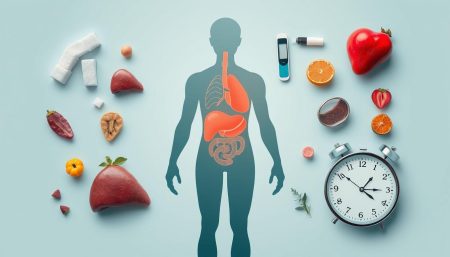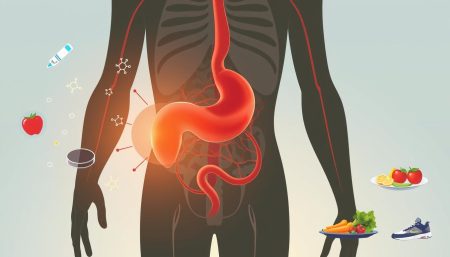Diabetes mellitus is a big challenge in public health, affecting millions worldwide. It involves complex body processes and serious health complications. It’s not just about high blood sugar; it’s a long-term battle that needs careful management and understanding.
The condition’s widespread nature highlights the need for more awareness. This awareness is key to improving both personal health and healthcare systems.
Effective managing diabetes requires more than just medical treatment. It also involves daily efforts from those living with it. Proper management can reduce the risk of serious health problems. But, not controlling it well can lead to severe issues, showing the importance of learning about the disease.
Looking at the impact of diabetes reveals how it can affect life quality. It also shows the need for ongoing, informed efforts to fight it.
An Overview of Diabetes Mellitus
Diabetes mellitus is a group of metabolic diseases with high blood sugar levels for a long time. It happens when the pancreas doesn’t make enough insulin or when the body’s cells don’t use insulin well. Knowing the difference between type 1 and type 2 diabetes is key for good treatment and management.
Type 1 diabetes, also called insulin-dependent diabetes, usually starts in children and young adults. The body’s immune system attacks and destroys the cells in the pancreas that make insulin. Type 2 diabetes, more common in adults, is about insulin resistance. It’s often linked to lifestyle factors like obesity and not being active enough.
Keeping blood sugar levels normal is the main goal of diabetes treatment. This helps avoid the immediate effects of high blood sugar and reduces the chance of serious problems like nerve damage, kidney disease, and eye damage.
| Aspect | Type 1 Diabetes | Type 2 Diabetes |
|---|---|---|
| Dependency on Insulin | Yes | Often later in disease |
| Age at Diagnosis | Usually young (children/teens) | Mostly adults |
| Primary Cause | Autoimmune destruction of insulin-producing cells | Insulin resistance with eventual impairment in insulin secretion |
| Common Treatments | Insulin injections | Lifestyle changes, medication, possibly insulin |
The body’s failure to properly use glucose from the blood is at the heart of both types of diabetes mellitus. Understanding these basics helps people grasp the complexities of diabetes treatment strategies in the next sections.
The Causes of Diabetes
Understanding the causes of diabetes is key to preventing and managing it. This part explores the genetic, lifestyle, and environmental factors that lead to diabetes.
Genetic Susceptibility
Diabetes often runs in families, showing a strong genetic link. Certain genes affect how well the body uses insulin. This is important because it can lead to insulin resistance, a major factor in type 2 diabetes.
Lifestyle Factors Conducive to Diabetes
- Poor diet: Eating too much processed food and sugar increases diabetes risk.
- Lack of physical activity: Being inactive can lead to insulin resistance.
- Obesity: Being overweight is closely linked to type 2 diabetes because of insulin resistance.
These lifestyle choices greatly affect a person’s chance of getting diabetes. It shows how important it is to make healthy choices every day.
Environmental Triggers
Environmental factors also play a part in diabetes. Pollution and toxins can cause insulin resistance. This makes genetic factors and lifestyle choices even more important.
Symptoms of Diabetes to Watch For
Spotting early symptoms of diabetes is key to acting fast and managing the condition. This part will cover the first signs and more serious symptoms as diabetes gets worse. Knowing these signs is the first step to recognizing diabetes and avoiding its serious side effects.
Early Warning Signs
- Excessive thirst and frequent urination
- Extreme hunger despite regular eating
- Unexplained weight loss
- Fatigue and irritability
- Blurred vision
- Slow-healing sores or frequent infections
Symptoms in Advanced Stages
- Numbness or tingling in hands and feet
- Persistent itching skin
- Darkening of skin in areas of body creases
- Swollen or tender gums
- Severe mood changes
Knowing these diabetes mellitus symptoms helps in catching the disease early. If you notice any of these signs, get medical help right away.
| Early Symptom | Possible Complication if Untreated |
|---|---|
| Excessive thirst and urination | Kidney disease |
| Unexplained weight loss | Heart disease |
| Blurred vision | Vision loss |
| Slow-healing sores | Infections leading to amputation |
| Numbness in extremities | Peripheral neuropathy |
The Science Behind Blood Sugar Levels
Understanding blood sugar levels is key for managing glucose well, which is very important for people with diabetes mellitus. The body controls glucose levels with insulin, a hormone from the pancreas. Insulin helps cells take in glucose for energy or storage, keeping blood sugar levels healthy.
If the body can’t manage glucose well, like in diabetes, blood sugar levels get too high. This can cause serious health problems if not managed. So, it’s very important for people with diabetes to keep an eye on their blood sugar levels.
New technology has made it easier to track and manage blood sugar levels. Tools like continuous glucose monitors (CGMs) show glucose levels in real-time. This helps both patients and doctors understand glucose patterns better. It’s important for making treatment plans and adjusting diets or medicines.
| Device | Function | Importance in Diabetes Management |
|---|---|---|
| Blood Glucose Meter | Measures blood glucose levels at a specific moment | Essential for daily monitoring and immediate adjustments |
| Continuous Glucose Monitor (CGM) | Provides real-time, dynamic glucose readings | Crucial for understanding glucose trends and preventing episodes |
| Insulin Pump | Delivers consistent insulin doses | Key in automating insulin delivery to stabilize glucose levels |
Managing glucose well is a big part of living with diabetes. It’s not just about using technology. Eating right, staying active, and taking medicines as directed are also important. These steps help keep blood sugar levels healthy and prevent serious health problems.
Insulin Resistance and Its Role in Type 2 Diabetes
Insulin resistance is a key factor in type 2 diabetes. Understanding and managing it is vital for those at risk. It happens when cells in muscles, fat, and the liver don’t respond well to insulin. This makes it hard for them to take up glucose from the blood.
The pancreas then makes more insulin to help. But, it can only do this for so long. Eventually, this leads to type 2 diabetes. So, finding ways to manage and prevent it is important.
Understanding Insulin Resistance
Insulin resistance takes years to develop. It’s influenced by genetics, lifestyle, and body weight. People with it often don’t notice symptoms right away.
This silence increases the risks of high blood sugar levels.
Preventing and Managing Insulin Resistance
Lifestyle choices are key in managing insulin resistance. Regular exercise and a diet low in processed sugars and saturated fats help. Losing weight is also important, as too much fat, mainly around the belly, can lead to insulin resistance.
| Action | Impact on Insulin Sensitivity | Recommended Frequency |
|---|---|---|
| Aerobic Exercise | Increases glucose uptake by muscles | Daily |
| Weight Loss | Enhances cellular response to insulin | Maintain as per BMI |
| Balanced Diet | Improves overall metabolic health | Every meal |
By making these changes part of your daily life, you can lower your risk of type 2 diabetes. Being aware and proactive is key to type 2 diabetes prevention. It helps keep you healthy and well for the long term.
Diagnosing Diabetes Mellitus
Diagnosing diabetes is key to managing it well. Knowing about diabetes tests and blood sugar monitoring helps both patients and doctors. It makes managing diabetes more effective.
The main tools for finding out if someone has diabetes are:
- Fasting Plasma Glucose Test (FPG)
- Oral Glucose Tolerance Test (OGTT)
- Hemoglobin A1C Test
Each test has its own way of working and importance:
- Fasting Plasma Glucose Test needs an eight-hour fast. It checks blood sugar at one time.
- Oral Glucose Tolerance Test checks blood sugar before and after a sugar drink. It shows how well the body handles sugar.
- Hemoglobin A1C Test shows blood sugar levels over three months. It helps plan long-term care.
How these tests show results helps figure out if someone has diabetes and what stage it is:
| Test | Normal | Pre-Diabetes | Diabetes |
|---|---|---|---|
| FPG (mg/dL) | 100-125 | ≥126 | |
| OGTT 2-hour value (mg/dL) | 140-199 | ≥200 | |
| A1C (%) | 5.7-6.4 | ≥6.5 |
Regular and accurate blood sugar monitoring is vital. It’s not just for finding out if you have diabetes. It’s also for managing it well.
Using these tests, doctors can create treatment plans that really help people with diabetes. These plans can greatly improve their health.
Comprehensive Diabetes Treatment Strategies
Dealing with diabetes requires a two-pronged approach. This includes medical treatment for diabetes and lifestyle changes for diabetes. This strategy helps manage symptoms and boosts health and life quality for those with diabetes.
Medical Interventions
Medical treatments for diabetes include medicines, insulin, and sometimes surgery. These help keep blood sugar levels normal and prevent serious problems. Here are some common treatments:
- Metformin: often the first choice for type 2 diabetes
- Insulin injections: for daily blood sugar control
- Bariatric surgery: for those with obesity-related type 2 diabetes
Lifestyle Modifications
Lifestyle changes can greatly impact diabetes management. Key changes include:
- Eating less sugar and carbs
- Staying active to control blood sugar and lose weight
- Checking blood sugar regularly to guide treatment
The table below shows how medical and lifestyle treatments work together. It highlights their benefits in managing diabetes.
| Treatment | Benefits | Category |
|---|---|---|
| Metformin | Reduces liver glucose production | Medical |
| Dietary Changes | Improves glucose tolerance | Lifestyle |
| Exercise | Increases insulin sensitivity | Lifestyle |
| Insulin Therapy | Regulates blood sugar levels | Medical |
Medical treatments and lifestyle changes for diabetes work together well. They offer the best chance for managing the disease and better health outcomes. A complete approach to diabetes treatment helps people live healthier, more active lives. By focusing on both medical and lifestyle interventions, diabetes management improves significantly. This shows the importance of a multi-faceted treatment plan.
Managing Diabetes Through Diet
Managing diabetes through diet can greatly improve your life and control blood sugar. Knowing what foods to eat is key to a balanced diet for diabetics. We’ll explore how the right food choices can lead to better health for those with diabetes.
The Importance of a Diabetic Diet
A diabetic diet is not just about cutting out foods. It’s about eating a balanced diet that includes all the nutrients you need. It helps keep blood sugar levels stable and prevents serious diabetes complications.
Dietary Recommendations for Diabetics
At the heart of a diabetic diet is watching how much carbohydrate you eat. Eating foods high in fiber and choosing healthy fats is also important. Let’s look at some specific tips for managing diabetes through diet.
| Food Group | Recommended Foods | Foods to Avoid |
|---|---|---|
| Carbohydrates | Whole grains, leafy greens, fresh fruits | Refined sugars, white bread, pastries |
| Proteins | Lean meats, plant-based proteins, fish | High-fat meats, deep-fried foods |
| Fats | Avocados, nuts, olive oil | Trans fats, margarines, fast food |
| Fiber | Legumes, whole fruits, whole grains | Low-fiber cereals, canned vegetables |

Following these dietary tips can help diabetics manage their condition better. It’s also important to regularly check in with a healthcare provider. They can help make sure your diet is right for you.
Regular Exercise: Vital for Managing Diabetes
Adding regular exercise to your daily routine is key for good diabetes control. Research shows that regular physical activity makes your body more sensitive to insulin. This helps lower blood sugar levels and may cut down on the need for medication.
Being active helps manage diabetes well. It lowers the risk of diabetes-related problems. Exercise also helps with heart health, weight loss, and mental well-being.
- Brisk walking or jogging, which can be adapted to fitness levels and local environments.
- Swimming, a low-impact exercise ideal for those with joint issues.
- Cycling, either stationary or on a path, which is beneficial for cardiovascular and lower body strength.
- Strength training using light weights or body weight exercises to maintain muscle mass and metabolic rate.
- Yoga or Pilates for flexibility, muscle tone, and stress reduction.
Start an exercise plan with a doctor’s help to stay safe, even with diabetes. Start slowly and increase the intensity and time to avoid injuries and get the most health benefits.
| Exercise Type | Benefits | Frequency Recommendation |
|---|---|---|
| Walking | Improves cardiovascular health, aids insulin sensitivity | Daily, 30 mins |
| Cycling | Low impact, strengthens lower body and heart | 3-5 times a week, 30-45 mins |
| Yoga | Enhances flexibility, reduces stress | 2-3 times a week, 20-60 mins |
| Strength Training | Builds muscle, boosts metabolism | 2-4 times a week, 20-30 mins |
Each exercise helps control diabetes and improves overall health. Being active is key to managing and possibly reversing diabetes.
Diabetes Mellitus and Mental Health
Diabetes affects more than just our bodies. It also impacts our emotional well-being. The connection between diabetes and mental health is strong. Managing diabetes can lead to anxiety and depression.
Stress management is key for both diabetes and mental health. High stress can make it hard to control blood sugar. But, managing stress well can improve blood sugar and mental health.
- Mindfulness and meditation
- Regular physical activity
- Cognitive behavioral therapy
- Support groups
Using these strategies can keep emotions stable and handle diabetes’s mental challenges. Focusing on emotional well-being is vital for diabetes management. Doctors should include mental health support in diabetes care plans.
Understanding and Preventing Complications of Diabetes
Diabetes is a chronic condition that affects millions worldwide. It can lead to serious health problems if not managed well. Knowing the complications of diabetes is key for patients and doctors to reduce risks and improve life quality. This part will look at both short-term and long-term diabetes complications and how to avoid them.
Short-term Complications
Short-term diabetes problems include hypoglycemia, ketoacidosis, and hyperosmolar hyperglycemic state. These issues need quick action to avoid serious harm. It’s important to spot early signs and keep blood sugar levels in check to prevent these diabetes complications.
Long-term Complications
Diabetes can cause long-term damage to organs and systems. Major long-term complications of diabetes include heart disease, kidney failure, nerve damage, and eye problems. Using a full management plan can greatly lower the chance of getting these chronic diabetes conditions.
Here’s a detailed look at both short-term and long-term complications. It shows why managing diabetes well and keeping an eye on it is so important.
| Complication Type | Associated Condition | Preventive Measures |
|---|---|---|
| Short-term | Hypoglycemia | Regular glucose monitoring, balanced diet |
| Short-term | Ketoacidosis | Insulin therapy adherence, hydration |
| Long-term | Cardiovascular Disease | Control blood pressure, lipid-lowering therapy |
| Long-term | Renal Failure | Regular kidney function tests, ACE inhibitors |
| Long-term | Neuropathy | Tight glucose control, foot care education |
| Long-term | Retinopathy | Annual eye exams, laser treatment if necessary |
Breaking Down Myths Surrounding Diabetes
It’s important to spread the word about diabetes awareness. We need to clear up diabetes myths and diabetes misconceptions. This section aims to give you the facts to help those living with diabetes.
Many people think diabetes isn’t a big deal. But it’s a serious condition that needs careful management. This includes regular checks and making lifestyle changes. For more on how diabetes can affect hair, check out the link about diabetes and hair health.
| Myth | Fact |
|---|---|
| Sugar consumption directly causes diabetes. | Type 2 diabetes is caused by genetics and lifestyle factors, not by sugar alone. |
| Diabetes is contagious. | Diabetes cannot be transmitted from one person to another. |
| Only overweight individuals get diabetes. | While being overweight is a risk factor, diabetes can affect individuals of any weight. |
Knowing these truths helps fight diabetes misconceptions. It also boosts diabetes awareness. This way, we can offer better support and care for those with diabetes.
The Global Impact of Diabetes Mellitus and Future Directions
The global diabetes epidemic is a major health issue. It affects millions and puts a big strain on healthcare budgets. With more people getting type 2 diabetes, finding better ways to manage it is urgent.
There are many people living with diabetes, and even more who don’t know they have it. Experts predict these numbers will keep growing. This makes finding new treatments and care plans even more important.
Diabetes research is moving forward fast. New medicines and technologies are giving hope for better diabetes care. For example, Ozempic helps control blood sugar and can also help with weight loss.
Health education and prevention programs are getting better too. They aim to help more people get the care they need. This shows a strong global effort to fight diabetes.
Doctors and people with diabetes are working together to tackle this problem. With more research and new treatments, diabetes’s impact can be reduced. This is good news for those living with diabetes and for the future of health care.
FAQ
Q: What is diabetes mellitus and how does it impact health?
A: Diabetes mellitus is a chronic condition where the body either does not produce enough insulin or cannot use the insulin it produces effectively, leading to high blood sugar levels. This can lead to serious complications such as heart disease, stroke, kidney failure, blindness, and lower limb amputations. Effective management of diabetes is key to preventing these complications.
Q: What are the differences between type 1 and type 2 diabetes?
A: Type 1 diabetes is an autoimmune condition where the body’s immune system attacks the insulin-producing cells of the pancreas, leading to little or no insulin production. It often occurs in childhood. Type 2 diabetes, which is more common, is characterized by insulin resistance, where the body’s cells do not respond properly to insulin. Type 2 diabetes is frequently associated with obesity and usually occurs in adults, but it can also develop in children.
Q: What are the most prominent causes of diabetes?
A: The causes of diabetes are multifactorial and may include genetic susceptibility, lifestyle factors such as poor diet and lack of physical activity, obesity, and certain environmental factors. Type 1 diabetes is more strongly linked to genetic factors than type 2 diabetes, for which lifestyle plays a significant role.
Q: What are the common symptoms of diabetes to watch for?
A: Common symptoms of diabetes include increased thirst and hunger, frequent urination, fatigue, blurred vision, and slow-healing sores or infections. These symptoms can range from mild to severe and typically develop over a period of time, specially in type 2 diabetes.
Q: Why are blood sugar levels important in managing diabetes?
A: Blood sugar levels are critical in managing diabetes because they indicate how well the body is processing glucose. Maintaining normal blood sugar levels can help prevent the short-term and long-term complications of the disease. Regular monitoring is essential for managing diabetes treatment effectively.
Q: What is insulin resistance and how does it contribute to type 2 diabetes?
A: Insulin resistance is a condition where the body’s cells do not interact with insulin as effectively as they should. Over time, this resistance can lead to higher blood sugar levels as the cells become less capable of absorbing glucose. Insulin resistance is a primary contributor to the development of type 2 diabetes.
Q: What tests are used to diagnose diabetes mellitus?
A: Diabetes mellitus is diagnosed using various tests that measure blood sugar levels, such as fasting blood glucose tests, oral glucose tolerance tests, and the glycated hemoglobin (A1C) test, which indicates average blood sugar over the past 2 to 3 months.
Q: What are the main strategies for diabetes treatment?
A: The main strategies for diabetes treatment involve a combination of medical interventions, such as medication or insulin therapy, and lifestyle modifications, including dietary changes and increased physical activity. It is important to tailor these strategies to the individual needs of the patient.
Q: How should diabetes be managed through diet?
A: Managing diabetes through diet involves eating a balanced diet that focuses on portion control, reducing sugar and refined carbohydrates, and incorporating whole grains, lean proteins, healthy fats, and vegetables. Carb counting and understanding the glycemic index of foods can also aid in managing blood sugar levels.
Q: Why is regular exercise important for people with diabetes?
A: Regular exercise is vital for people with diabetes because it helps lower blood sugar levels, improves insulin sensitivity, and can assist with weight management. Physical activity is an essential component of diabetes management and can help prevent or delay diabetes-related health problems.
Q: How does diabetes affect mental health?
A: Diabetes can have a significant effect on mental health, increasing the risk of issues such as depression, anxiety, and diabetes distress. Stress management and support for emotional well-being are important aspects of managing diabetes, as mental health significantly impacts glucose control and overall quality of life.
Q: What are the short-term and long-term complications of diabetes?
A: Short-term complications of diabetes include hyperglycemia, hypoglycemia, and diabetic ketoacidosis, which require immediate attention. Long-term complications may include cardiovascular diseases, neuropathy, nephropathy, retinopathy, and increased susceptibility to infections, all of which can have severe impacts on a patient’s health if not properly managed.
Q: What are some common myths surrounding diabetes?
A: Common myths about diabetes include misconceptions such as “diabetes is not a serious disease” or “only overweight individuals get diabetes.” Another myth is that people with diabetes must avoid sugar completely. Educating the public with factual information is key to dispelling these myths and properly managing the disease.
Q: What is the global impact of diabetes mellitus?
A: The global impact of diabetes mellitus is significant, with millions of people affected worldwide. It is one of the leading causes of death and disability and poses a considerable burden on healthcare systems. With rising prevalence rates, it’s considered an epidemic, prompting increased focus on research, prevention, and management strategies on an international scale.


















